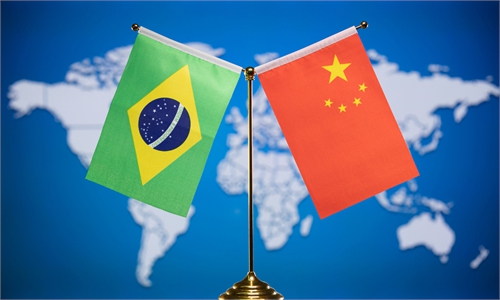
Illustration: Xia Qing/GT
August 15 marks the 50th anniversary of the establishment of diplomatic relations between China and Brazil. In May, the two countries have emerged as key players in global diplomacy by proposing a joint approach to peacefully resolving the crisis in Ukraine. The joint proposal for peace negotiations signifies a major commitment from these Global South powers to seek just and peaceful solutions to international conflicts. This move marks a new era of diplomatic leadership for developing nations, which are becoming increasingly influential in global affairs.By adopting an objective and just stance, China and Brazil position themselves as ideal mediators, facilitating dialogue between Ukraine and Russia without taking sides. This approach reflects their diplomatic traditions of promoting peace through dialogue and negotiation, a fundamental characteristic they share. Their support to hold an international peace conference demonstrates their ability to create inclusive and balanced negotiation platforms, fostering an environment conducive to a comprehensive cease-fire and the construction of lasting peace.
This initiative underscores the importance of a multilateral approach to conflict resolution and highlights the crucial role of the Global South in international governance. China and Brazil's active engagement in the Ukraine peace process shows how emerging powers can offer fresh and balanced perspectives on complex conflicts, often bypassing conventional, Western-centric solutions.
Beyond their peace initiatives, China and Brazil advocate for reforms in global institutions to make them more representative and responsive to the needs of developing countries. As leaders of the Global South, they are well-positioned to promote discussions on global peace and security within the G20 and the United Nations (UN). Proposals to reform the UN Security Council, for instance, could increase the representation of developing countries, making this institution more effective in preventing and resolving conflicts. By promoting the G20 as a platform for discussions on the Ukraine crisis, these nations can help build a global consensus around peaceful solutions and foster global economic stability.
Within the BRICS framework, the China-Brazil partnership proves vital in expanding the group's influence across various fronts.
Economic and commercial cooperation between China and Brazil can extend to strengthening bilateral trade and investments in strategic sectors like infrastructure and technology. Facilitating trade among BRICS countries by removing tariff barriers and developing payment systems in local currencies can reduce dependence on the US dollar and bolster local economies. Infrastructure projects led by China, such as the Belt and Road Initiative, can better connect BRICS economies, promoting economic development and regional integration.
Technological innovation is another crucial area in which China and Brazil can collaborate. Joint research and development efforts can boost the technological competitiveness of the BRICS, particularly in renewable energy, biotechnology, and digital technology. Establishing innovation centers funded by the New Development Bank, focused on developing new technologies and creating innovative startups, would enhance economic prosperity and technological leadership among BRICS countries.
With its advances in digital technology and artificial intelligence, China can share its experiences and knowledge with Brazil and other BRICS nations. This technological exchange can help build more robust innovation ecosystems, enabling these countries to compete in an increasingly digitalized world. Brazil, in turn, can contribute its expertise in biotechnology and sustainable agriculture, where it has significant knowledge.
Moreover, joint projects in clean energy and social inclusion programs can address global challenges like climate change and promote balanced and inclusive development. These initiatives reaffirm China and Brazil's commitment to sustainable growth and poverty reduction.
For instance, by investing in green technologies and promoting renewable energy, China and Brazil can help mitigate the effects of climate change while creating sustainable economic opportunities for their populations.
Expanding the BRICS group to include more members who share these development and equity goals can provide even greater power to combat poverty and reduce social inequalities. Having additional countries in the BRICS group, particularly those facing similar challenges, can benefit from access to infrastructure investments, technology transfer, and expanded trade networks. This collaborative growth allows more nations to adopt innovative solutions to social and economic problems, strengthening the group's global impact.
Politically, coordinating China and Brazil's positions in international forums strengthens BRICS cohesion and increases its influence in global discussions on security, economic development and human rights. Promoting the BRICS as an influential force in global talks is essential to advocating for a more prominent role for developing countries. China and Brazil can help create a more just and equitable international system by working together to strengthen group cohesion.
Defending international law and national sovereignty is a fundamental principle for both countries. By reaffirming their commitment to territorial integrity and rejecting the use of weapons of mass destruction, China and Brazil demonstrate a firm commitment to a rules-based international system. As active defenders of a just and balanced international system, they can lead international campaigns to strengthen non-proliferation regimes for nuclear, chemical, and biological weapons, promoting global security and stability. By working together to defend the principle of national sovereignty in international forums, China and Brazil ensure that all nations are treated fairly.
The author is the director of the China-Brazil Center for Research and Business. opinion@globaltimes.com.cn

